Wasps and bees are often abundant in late summer, and because they look alike, most people confuse wasps with bees. Wasps and bees are so similar that it has caused people to wonder about the possibility of wasps producing honey.
So, do wasps make honey? Generally, wasps don’t make honey. However, some species of wasps make honey. One such wasp species that makes honey is the Mexican honey wasp, which can be found in North and South America. They make the honey the same way honey bees do and is even considered edible.
Read on to find out how the Mexican honey wasp makes honey safe for humans to consume, the differences between wasps and honey bees, as well as wasps’ eating habits.
Do Wasps Make Honey?
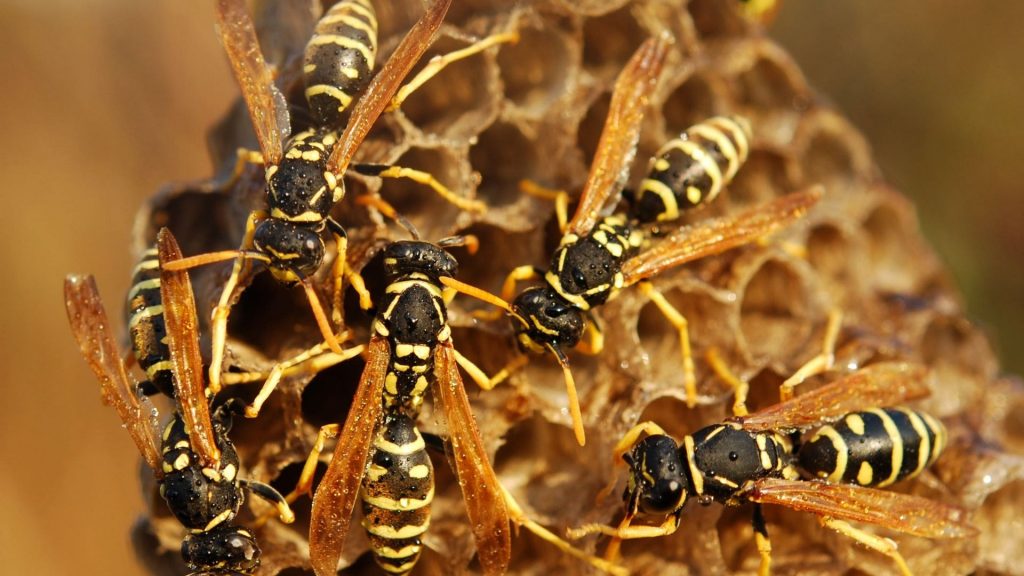
No, most wasps are unable to make honey. However, there are a genus of wasps called the honey wasps (Brachygastra) which consists of 17 species but only the Mexican honey wasp (Brachygastra mellifica) and the Brachygastra lecheguana are known to collect and store nectar nearly the same way as bees do.
Do Hornets Make Honey?
Hornets do not make honey even though a large portion of their diet is from nectar. Of course, they consume nectar from plants and insects as a source of energy and nutrients, but that doesn’t mean they’ll produce honey as bees do.
Do Wasps Nests Have Honey?
Wasps’ nests do not have honey, nor do they need honey. Most wasp species are solitary insects and only build nests to benefit their offspring. Their young ones need a protein source to grow; therefore, they turn to forage insects to feed them rather than honey.
Mexican Honey Wasp
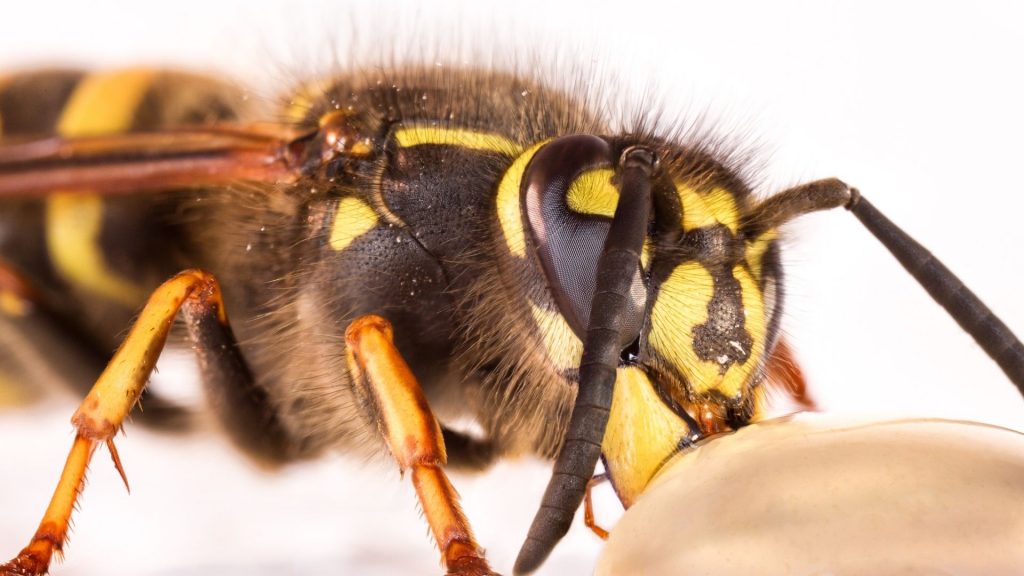
The Mexican honey wasp is a social wasp found in North and South America, from Texas to Nicaragua. It forms paper nests in shrubs and trees and looks similar to a honey bee but is smaller, nearly all black, and not all that hairy in comparison.
Just like honey bees, however, Mexican honey wasps make honey. They employ almost the same method as bees to produce honey. Using the same honey production method implies that wasps will pollinate and drink nectar in the same way bees do. Then, they regurgitate it to make it into honey.
Bees only consume nectar and pollen from flowers to make honey. However, since pollination is often tricky for the honey wasp, it has to feed on other insects such as the Asian citrus.
Do Wasps Like Honey?
Wasps love honey, especially since they have a sweet tooth. Because wasps are always flying, they burn a lot of energy and constantly need to feed on high-energy sugary substances. They get this sweet liquid from plant nectar in early spring and from honey in late summer.
Do Wasps Pollinate?
Yes, but they are less efficient pollinators because their bodies are less hairy than bees. The smoothness of wasps’ bodies means that they cannot collect and store pollen as well as bees do.
However, some wasp species surpass bees as efficient pollinators in some environments, producing moderate or large amounts of nectar. For example, orchids rely mainly on wasps to pollinate them and may go extinct if wasps cease to exist.
Difference Between Honey Bee and Wasp | Honey Bee vs. Wasp
Most people confuse wasps and bees because they look alike. They have the same body shape with six legs, a head, thorax, and abdomen. They also have two antennas with an exoskeleton.
However, wasps are more aggressive than bees. They have a thinner, more extended, and smoother body. Bees, on the other hand, have hairier bodies to collect and hold pollen. Because wasps’ bodies are smooth, they cannot collect and store pollen as well as bees do.
The inability of wasps to keep pollen makes them resort to other diets like feeding on insects such as flies, caterpillars, grasshoppers, etc.
Next time you’re on a picnic, and you see these intruders, you can identify the difference between wasps and bees from the following:
- Body: Wasps have slender, smooth, and shinier bodies, while bees have rounder and hairier bodies.
- Stingers: Wasps do not lose their stingers after stinging; as a result, they can sting multiple times. Bees, on the other hand, lose their stingers and die on the first try.
- Skin: Wasps have very few hairs, while bees are hairy.
- Food: Wasps feed on pollen and nectar and prey on other insects, ants, and even human food, while bees feed only on pollen and nectar.
Do Wasps Kill Honey Bees?
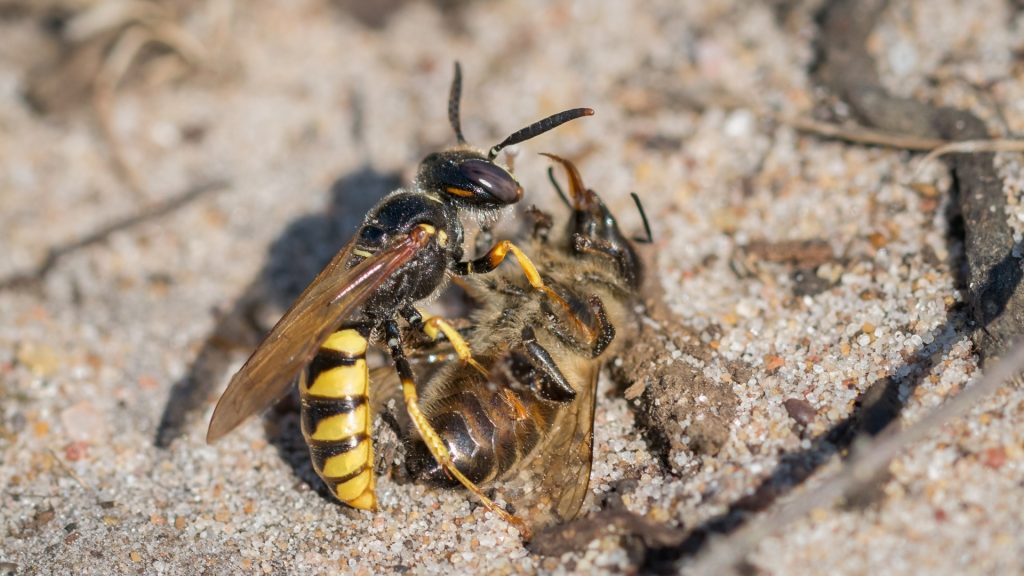
Yes, it’s common for wasps to attack bees. They kill honey bees because they enjoy sweet food and often attack bee colonies to steal their honey. Wasps are very lethal to bees, and sometimes, they will bite off the bee’s head and abdomen, taking the thorax back to their own nest to feed it to their larvae.
Do Wasps Steal Honey From Bees?
Yes. Wasps will steal honey from honey bees to satisfy their sweet tooth when their larvae eventually hatch and will no longer make the honeydew by late summer/early autumn.
Early in the year, wasps will prey on insects, including bees, and feed them to their larvae, which need the protein for their bodies to grow. In turn, the larvae produce sugary honeydew for the wasps to consume.
What Do Wasps Eat and Drink?
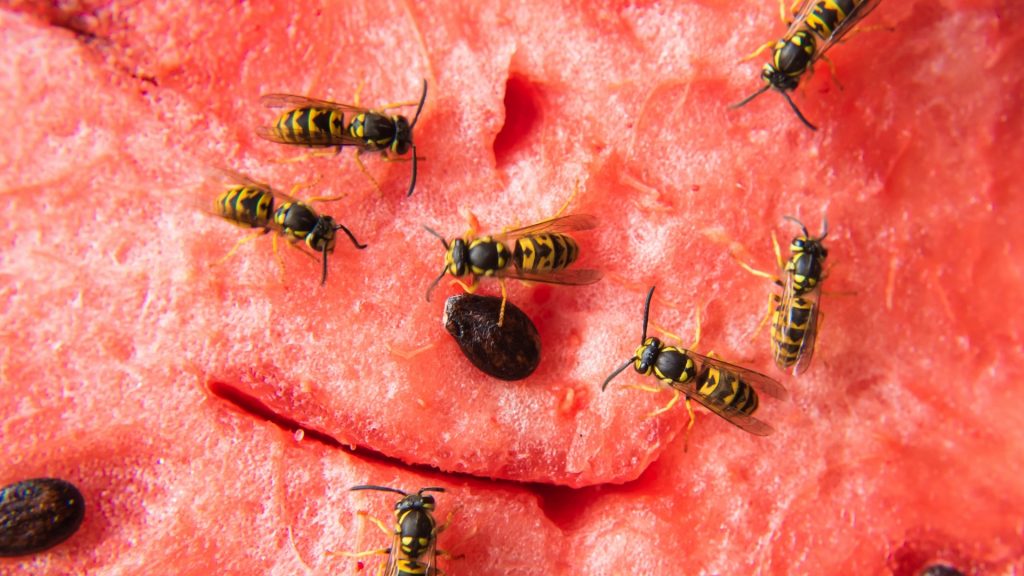
Their diet usually consists of eat nectar, fruit, honey, small insects, and plants. Their primary diet is sugary substances such as fruit and honey for the energy they need to move around.
Related: What Do Wasps Eat? | Information & Facts
What Do Hornets Eat?
Hornets eat caterpillars, crickets, grasshoppers, and similar pests, just like wasps do. Hornets also occasionally eat fruit and tree sap; however, they do not have the scavenging behavior of wasps and will not bother human foods as much as wasps.
What Do Paper Wasps Eat?
Paper wasps feed on nectar and pollen and hunt insects, such as caterpillars, crickets, grasshoppers, etc., to nourish their larvae. Wasps also chew on wood to form a pulp which they use to build their nests.
The good thing about paper wasps is that they have ecological benefits because they assist in pollination by feeding on nectar. They also control the pest insect population by feeding insects to their larvae.
What Do Yellowjackets Eat?
Yellowjackets have a diet rich in sugar and carbohydrates, which they get from fruits, flower nectar, and tree sap. Wasps are also carnivorous and eat insects such as spiders and caterpillars.
Additionally, yellowjackets are beneficial to humans because they feed on insects that attack crops such as flies, beetles, cabbage worms, and crickets. Their sweet tooth means that they are often scavenging around garbage cans, cookouts, picnics, carnivals, etc., looking for sugary drinks and leftovers.
How Do Wasps Eat? | Eating Mechanism
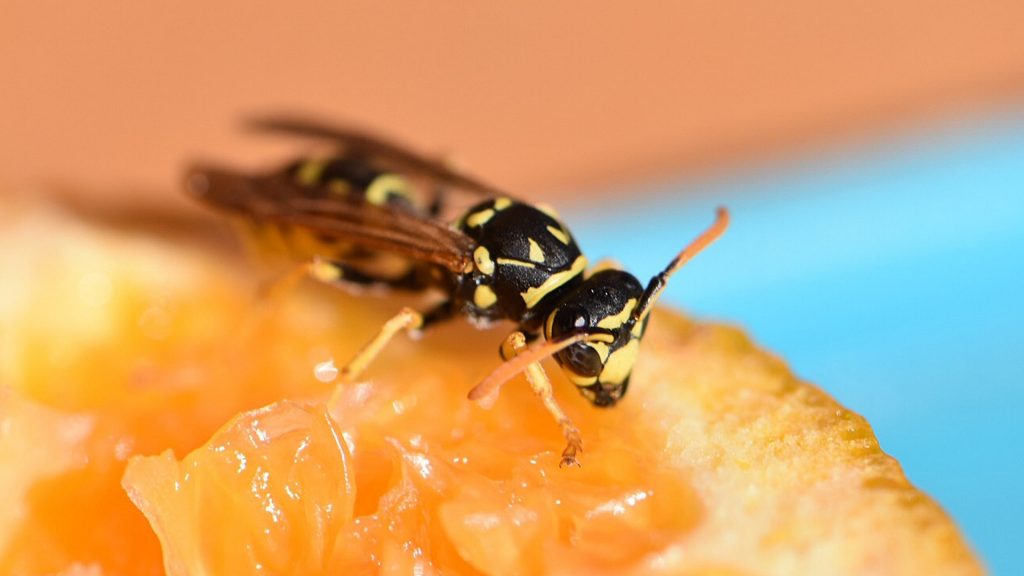
Adult wasps use their shiny, giant stingers to capture their prey and their jaws to chew their prey before feeding it to their young. Wasps do not only consume pollen and nectar; common wasps such as the bald-faced hornet also feed on a variety of insects and ants.
Wasps also enjoy human food. They love sweet things, and you will find them hovering around spilled drinks and garbage in search of sweet food remnants. They will drink from fruit juices and consume whole fruits such as bananas, oranges, apples, soda, etc.
What Eats Wasps? | Predators
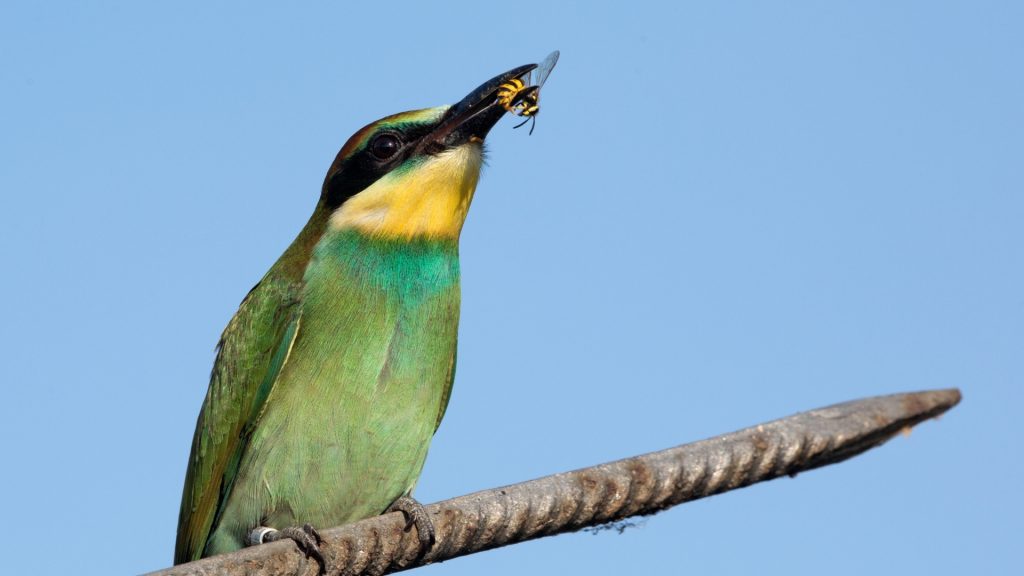
Wasps are prey to other animals, such as the bee-eater, which specializes in eating stinging animals. Another predator to wasps is the honey buzzard, which attacks their nest and eats their larvae. Other predators include praying mantis, dragonflies, centipedes, birds, and bats.
List of Sources
Breece, C., Wyns, D., & Sagili, R. (2018). Protecting Honey Bees from Yellow Jacket Wasps. O
Kness A. (2020). Wasps, Surprisingly Cool Pollinators.
Washington State Department of Health. (n.d.). Bees and Wasps.
Victoria State Government, Department of Health and Human Services. (2018). European Wasps Pest Control.
- How to Get Rid of Cockroaches? | Proven Strategies & Solutions! - June 24, 2023
- Powerful Homemade Wasp and Bee Sprays (with Recipes) - March 4, 2023
- Crazy Ants Invasion | Eradicate & Prevent Unwanted Guests - February 24, 2023
